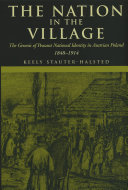

Most ebook files are in PDF format, so you can easily read them using various software such as Foxit Reader or directly on the Google Chrome browser.
Some ebook files are released by publishers in other formats such as .awz, .mobi, .epub, .fb2, etc. You may need to install specific software to read these formats on mobile/PC, such as Calibre.
Please read the tutorial at this link: https://ebookbell.com/faq
We offer FREE conversion to the popular formats you request; however, this may take some time. Therefore, right after payment, please email us, and we will try to provide the service as quickly as possible.
For some exceptional file formats or broken links (if any), please refrain from opening any disputes. Instead, email us first, and we will try to assist within a maximum of 6 hours.
EbookBell Team

4.7
56 reviewsHow do peasants come to think of themselves as members of a nation? The widely accepted argument is that national sentiment originates among intellectuals or urban middle classes, then "trickles down" to the working class and peasants. Keely Stauter-Halsted argues that such models overlook the independent contribution of peasant societies. She explores the complex case of the Polish peasants of Austrian Galicia, from the 1848 emancipation of the serfs to the eve of the First World War.
In the years immediately after emancipation, Polish-speaking peasants were more apt to identify with the Austrian Emperor and the Catholic Church than with their Polish lords or the middle classes of the Galician capital, Cracow. Yet by the end of the century, Polish-speaking peasants would cheer, "Long live Poland" and celebrate the centennial of the peasant-fueled insurrection in defense of Polish independence.
The explanation for this shift, Stauter-Halsted says, is the symbiosis that developed between peasant elites and upper-class reformers. She reconstructs this difficult, halting process, paying particular attention to public life and conflicts within the rural communities themselves. The author's approach is at once comparative and interdisciplinary, drawing from literature on national identity formation in Latin America, China, and Western Europe. The Nation in the Village combines anthropology, sociology, and literary criticism with economic, social, cultural, and political history.